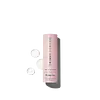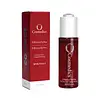What's inside
What's inside
 Key Ingredients
Key Ingredients

 Benefits
Benefits

 Ingredients Side-by-side
Ingredients Side-by-side

Water
Skin ConditioningGlycerin
HumectantPentylene Glycol
Skin ConditioningSodium Hyaluronate
HumectantBetaine
HumectantHydrolyzed Wheat Protein
Skin ConditioningOligopeptide-78
Skin ConditioningPalmitoyl Decapeptide-21
Skin ConditioningZinc Palmitoyl Nonapeptide-14
Skin ConditioningHexapeptide-9
Skin ConditioningDecapeptide-21
Skin ConditioningOligopeptide-1
Skin ConditioningXylitylglucoside
HumectantAnhydroxylitol
HumectantXylitol
HumectantSucrose
HumectantPlankton Extract
Skin ConditioningGlucose
HumectantLecithin
EmollientButylene Glycol
HumectantHydroxyacetophenone
AntioxidantSodium Hydroxide
BufferingWater, Glycerin, Pentylene Glycol, Sodium Hyaluronate, Betaine, Hydrolyzed Wheat Protein, Oligopeptide-78, Palmitoyl Decapeptide-21, Zinc Palmitoyl Nonapeptide-14, Hexapeptide-9, Decapeptide-21, Oligopeptide-1, Xylitylglucoside, Anhydroxylitol, Xylitol, Sucrose, Plankton Extract, Glucose, Lecithin, Butylene Glycol, Hydroxyacetophenone, Sodium Hydroxide
Water
Skin ConditioningNiacinamide
SmoothingSodium Ascorbyl Phosphate
AntioxidantTripeptide-10 Citrulline
Skin ConditioningOligopeptide-68
BleachingPseudoalteromonas Ferment Extract
HumectantHydrolyzed Soy Protein
HumectantTripeptide-1
Skin ConditioningHydrolyzed Wheat Protein
Skin ConditioningLecithin
EmollientButylene Glycol
HumectantSodium Oleate
CleansingXanthan Gum
EmulsifyingCarbomer
Emulsion StabilisingDisodium EDTA
Caprylyl Glycol
EmollientPhenoxyethanol
PreservativeWater, Niacinamide, Sodium Ascorbyl Phosphate, Tripeptide-10 Citrulline, Oligopeptide-68, Pseudoalteromonas Ferment Extract, Hydrolyzed Soy Protein, Tripeptide-1, Hydrolyzed Wheat Protein, Lecithin, Butylene Glycol, Sodium Oleate, Xanthan Gum, Carbomer, Disodium EDTA, Caprylyl Glycol, Phenoxyethanol
Ingredients Explained
These ingredients are found in both products.
Ingredients higher up in an ingredient list are typically present in a larger amount.
Butylene Glycol (or BG) is used within cosmetic products for a few different reasons:
Overall, Butylene Glycol is a safe and well-rounded ingredient that works well with other ingredients.
Though this ingredient works well with most skin types, some people with sensitive skin may experience a reaction such as allergic rashes, closed comedones, or itchiness.
Learn more about Butylene GlycolWe don't have a description for Hydrolyzed Wheat Protein yet.
Lecithin is a term for a group of substances found in the cell membranes of plants, animals, and humans. They are made up of mixture of phospholipids.
This ingredient has emollient and emulsifying properties.
As an emollient, lecithen helps soften the skin and creates a barrier to keep moisture in.
As an emulsifier, it also helps prevent water and oil ingredients from separating. Lecithin can also help ingredients be better absorbed by the skin.
This is because the phospholipids in lecithin produce liposomes. Liposomes help other ingredients get through the skin barrier.
Depending on the source of this ingredient, lecithin may not be fungal acne safe. This is because some sources of lecithin come from soybean oil, which may feed the malassezia yeast that feeds fungal acne.
We recommend reaching out to the brand you are purchasing from to inquire about the source of their lecithin.
Some other names for this ingredient include soy lecithin and deoiled soy lecithin.
Learn more about LecithinWater. It's the most common cosmetic ingredient of all. You'll usually see it at the top of ingredient lists, meaning that it makes up the largest part of the product.
So why is it so popular? Water most often acts as a solvent - this means that it helps dissolve other ingredients into the formulation.
You'll also recognize water as that liquid we all need to stay alive. If you see this, drink a glass of water. Stay hydrated!
Learn more about Water